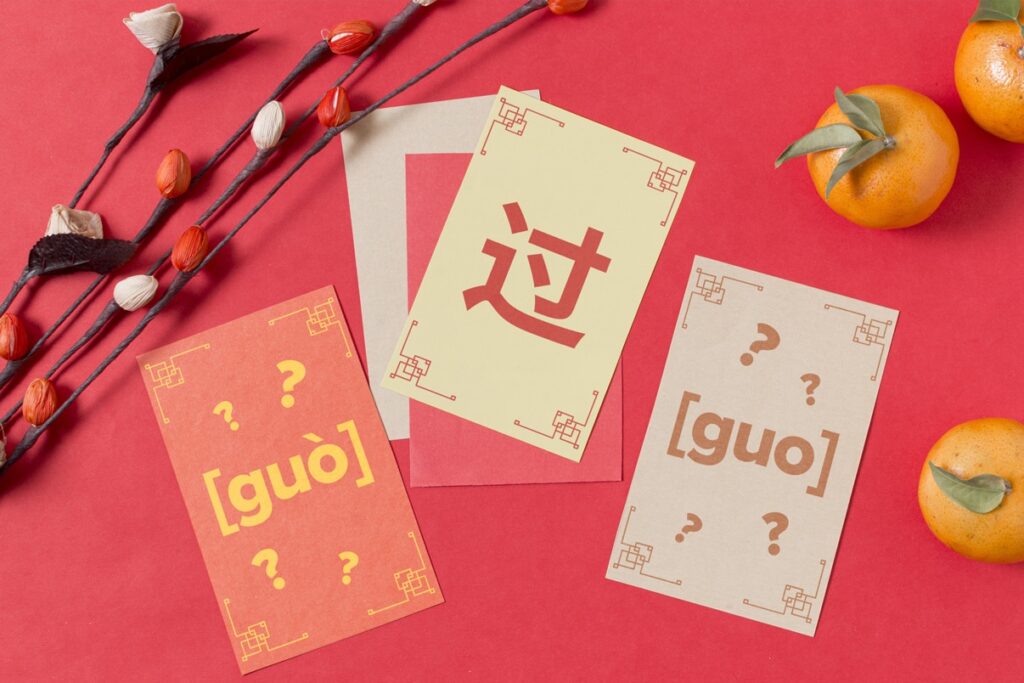
过 Guo in Chinese: 11 Uses as a Verb, Adverb and Aspect Particle
In a nutshell, 过 (guò) in Chinese represents the idea of passing some kind of boundary or limit—whether it’s abstract or concrete depends on how it’s used in a sentence.
In the fourth tone, it works as a verb or adverb. When it takes on the fourth tone, 过 (guo) becomes an aspect particle. Find out all the different functions and meanings of guo in this guide.
Contents
- The Chinese Radicals for Guo
- 过 (guò) as a Verb
- 过 (guò) as an Adverb
- 过 (guo) as an Aspect Particle
- And One More Thing...
Download: This blog post is available as a convenient and portable PDF that you can take anywhere. Click here to get a copy. (Download)
The Chinese Radicals for Guo
Since Chinese radicals can provide semantic and phonetic clues to the meaning of words, you might be interested to see a quick breakdown of 过—this kind of context is great for committing new characters to memory.
过 is composed of two parts:
辶 (chuò) — walk
寸 (cùn) — inch
This lets us know that the character has to do with some kind of movement over a short distance. You’ll also notice this as you encounter the word in native media, specifically with programs like FluentU that help you learn new words in context.
FluentU takes authentic videos—like music videos, movie trailers, news and inspiring talks—and turns them into personalized language learning lessons.
You can try FluentU for free for 2 weeks. Check out the website or download the iOS app or Android app.
P.S. Click here to take advantage of our current sale! (Expires at the end of this month.)
过 (guò) as a Verb
Beginners will most likely recognize 过 as a verb. 过 on its own has several definitions, but it can also be combined with other characters to form compound verbs in Chinese.
Let’s take a look at all of the definitions of 过 when it functions as a verb.
过 — To cross (over)
Perhaps the most common definition of 过 is “to cross,” “to go across” or “to pass through,” which indicates the basic idea of the rest of the definitions.
鸡为什么过马路?
(jī wèi shén me guò mǎ lù?)
Why did the chicken cross the road?
过 — To pass (time)
Following this notion of time, 过 can also be used when talking about the duration of time passing.
工作周过得很慢。
(gōng zuò zhōu guò de hěn màn.)
The workweek is passing slowly.
过 — To celebrate
If you want to discuss how you spend your time, particularly when concerning days off, holidays and such, 过 is the appropriate verb to use.
你怎么过新年?
(nǐ zěn me guò xīn nián?)
How do you celebrate the New Year?
过去 (guò qù) — To go over or pass by
Here’s the first compound verb. With 去 meaning “to go,” it makes perfect sense that 过去 would mean “to pass by” or “to go over.”
您可以让我过去吗?
(nín kě yǐ ràng wǒ guòqù ma?)
Can you let me pass by?
过来 (guò lái) — To come over
Because 来 means “to come,” it’s only natural for 过来 to mean “to come over (here).”
过来一下,我想跟你谈谈。
(guò lái yí xià, wǒ xiǎng gēn nǐ tán tán.)
Come over here for a moment. I want to talk with you.
超过 (chāo guò) — To exceed or surpass
超 on its own means “to exceed” or “to overtake,” but 超过 is the full vocab term.
她超过了我的期望。
(tā chāo guò le wǒ de qī wàng.)
She exceeded my expectations.
过 (guò) as an Adverb
过 can also be used to modify a verb. In other words, it can manifest as a Chinese adverb, usually paired with another character.
过 adverbs can be placed before or after a verb in a sentence.
过度 (guò dù) — too (much), over, excessively
When you want to show something is overly or excessively done, you can use the adverb 过度.
他运动过度了。
(tā guò dù yùn dòng.)
He over-exercised.
经过 (jīng guò) — by, past
经过 has several definitions, meaning “pass” or “course” as a noun and “to transit” as a verb. As an adverb, it means “by” or “past.”
司机开车经过了面包店。
(sī jī kāi chē jīng guò le miàn bāo diàn.)
The driver drove past the bakery.
不过 (bú guò) — merely, (nothing) but, only, no more than
不过 can work as a conjunction in Chinese, translated as “but” or “however.” As an adverb, 不过 is placed before the verb in a sentence to mean “solely” or “(nothing) but.”
钱只不过会带来问题。
(qián zhǐ bú guò huì dài lái wèn tí.)
Money brings (nothing) but problems.
过 (guo) as an Aspect Particle
When pronounced with the fifth or neutral tone, 过 becomes a particle, more specifically, an aspect particle in Chinese.
Because tenses and verb conjugations at large don’t exist in basic Chinese grammar, the language relies on words known as aspect particles to demonstrate the duration in which the verb is occurring. Basically, an aspect particle is a function word that describes how an experience or action relates to a certain timeframe.
Verb + 过 marks a past experience or past action
When talking about actions that have been completed at an unverified point in the past, you’d place 过 immediately after the verb of the sentence. This is also very similar to the present perfect in English.
It’s worth pointing out that 过 implies that an action happened at a nonspecific time in the past, which is different from 了 (le), another aspect particle associated with actions completed in the past.
她以前坐过地铁。
(tā yǐ qián zuò guo dì tiě.)
She has ridden the subway before.
Although the Chinese “le” also demonstrates a past action, 了 indicates that the action was completed at a definite point in time, where the timeframe has already been defined in the statement or can be implied from context. Simply put, 了 is pretty much the same as the past simple tense in English.
Of course, you can still use 过 and 了 in the same sentence. 过了 indicates an action that happened sometime in the immediate past.
Negate 过 with 没 (méi)
Now, if you want to negate a verb + 过, you would do so with 没 rather than 不 (bù).
Most verbs are indeed negated with 不. However, when 过 as an aspect particle is involved, you’re discussing whether or not a subject has carried out the action, implying the “have + verb” construction. “To have” in Chinese is 有 (yǒu), and because 有 is negated with 没, verb + 过 would also be negated with 没, where the sentence construction would be 没 + verb + 过.
This negated form can be translated to haven’t + past participle.
我去过温哥华,但没去过多伦多。
(wǒ qù guo wēn gē huá, dàn méi qù guo duō lún duō.)
I have been to Vancouver, but not to Toronto.
If you want to say that you have never done something before, you’d use the construction as 从来没有 + verb + 过.
You can also use the construction to modify the previous example. Notice the subtle difference.
我去过温哥华,但从来没有去过多伦多。
(wǒ qù guò wēn gē huá, dàn cóng lái méi yǒu qù guò duō lún duō.)
I have been to Vancouver, but never to Toronto.
Even though guo in Chinese functions as different parts of speech, the central theme of the definitions is the passing of some kind of boundary, whether it’s physical or something more abstract like time. Thus, there’s really no need to be intimidated by all these definitions!
And One More Thing...
If you want to continue learning Chinese with interactive and authentic Chinese content, then you'll love FluentU.
FluentU naturally eases you into learning Chinese language. Native Chinese content comes within reach, and you'll learn Chinese as it's spoken in real life.
FluentU has a wide range of contemporary videos—like dramas, TV shows, commercials and music videos.
FluentU brings these native Chinese videos within reach via interactive captions. You can tap on any word to instantly look it up. All words have carefully written definitions and examples that will help you understand how a word is used. Tap to add words you'd like to review to a vocab list.
FluentU's Learn Mode turns every video into a language learning lesson. You can always swipe left or right to see more examples for the word you're learning.
The best part is that FluentU always keeps track of your vocabulary. It customizes quizzes to focus on areas that need attention and reminds you when it’s time to review what you’ve learned. You have a 100% personalized experience.
Start using the FluentU website on your computer or tablet or, better yet, download the FluentU app from the iTunes or Google Play store. Click here to take advantage of our current sale! (Expires at the end of this month.)







